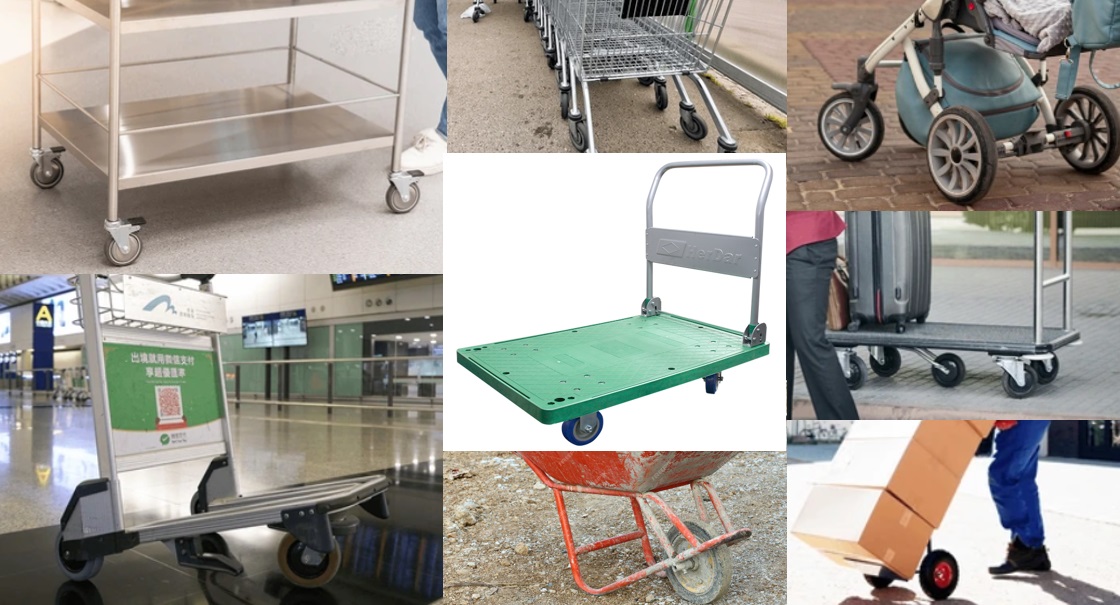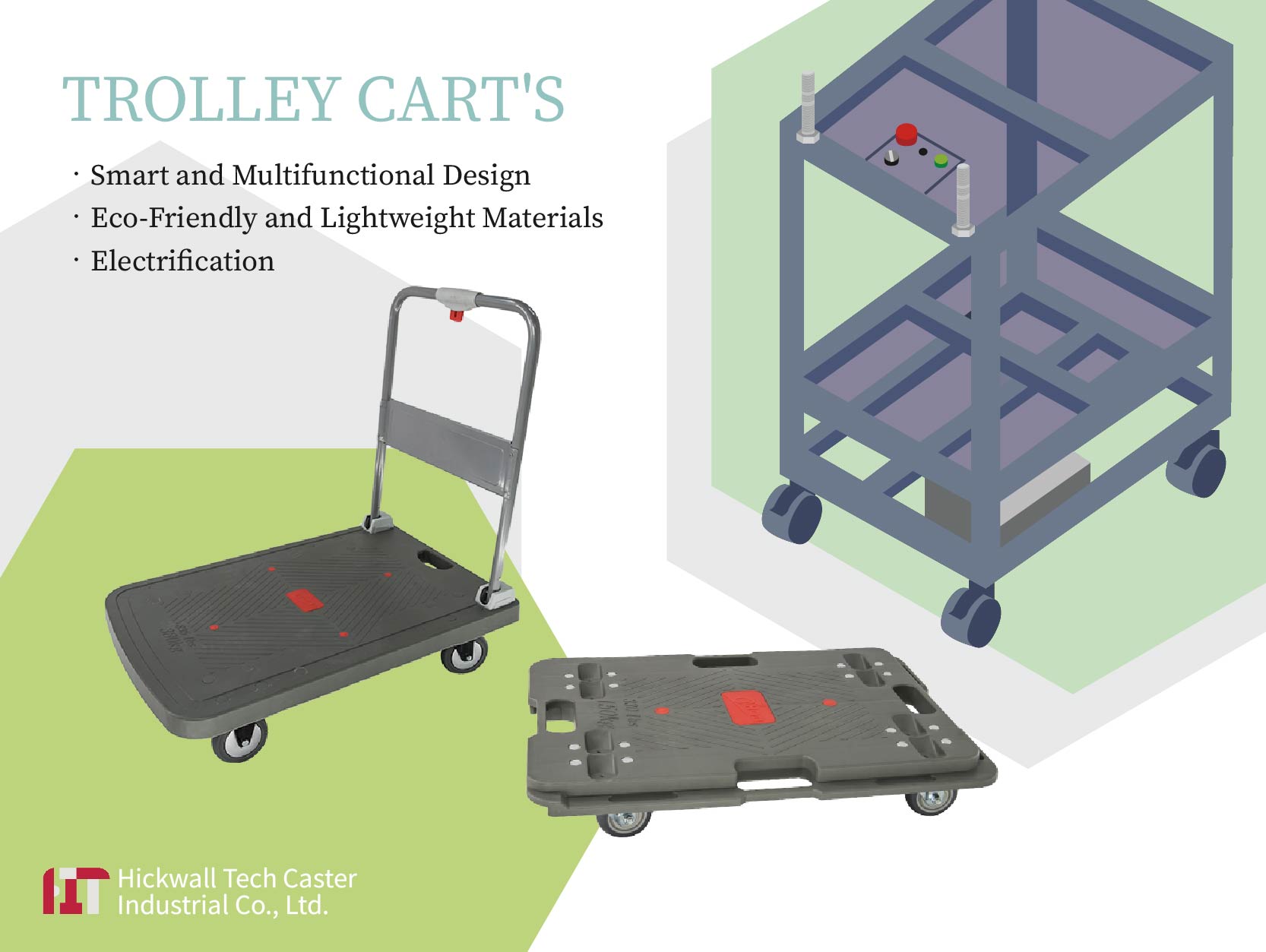How to Choose a Trolley carts? Six Key Points to Help You Understand trolley carts in Depth
Basic Introduction and Uses of trolley carts
A trolley cart is a simple yet practical tool used for transporting heavy or large items, commonly seen in logistics, warehousing, industrial, construction, and household moving scenarios. Typically comprising a frame, wheels, and handle, the trolley cart's design is straightforward but highly durable. It effectively reduces labor demands during transportation, improving efficiency.
I. Applications of Trolley Cart's
-
Logistics and Warehousing:In warehouses and logistics centers, trolley carts are used for moving goods, loading and unloading, or organizing shelves. They enable workers to quickly transport large quantities of items, saving time and reducing physical exertion during handling tasks.
-
Industrial Sector:In factories and production lines,trolley carts are often used to transport raw materials or finished products, especially when moving materials between different production stages. This approach not only improves production efficiency but also reduces the need for machinery, lowering operational demands.
-
Construction Sites:On construction sites, trolley carts are commonly employed for transporting building materials like bricks, concrete, and cement bags. trolley carts can handle substantial weight and are suitable for use on rough or uneven ground, allowing workers to deliver materials to designated spots with ease.
-
Household and Commercial Use:trolley carts have widespread applications in daily life, such as moving items during house relocation, transporting heavy items for gardening tasks, or restocking products in supermarkets and retail stores. Commercial establishments frequently use trolley carts to move large or heavy items.
-
Medical and Hospitality Industries:trolley carts are used for transporting luggage, cleaning supplies, food, or medical equipment. For instance, the healthcare industry utilizes specialized medical trolley carts to move instruments and supplies, facilitating quick and safe item transfers.
-
Other Specialized Scenarios:In certain specific scenarios, trolley carts are designed for specialized purposes. For example, luggage trolley carts are used in the airline industry, and high-speed sorting trolley carts are employed in e-commerce distribution centers. These professional trolley carts are tailored to meet unique needs, enhancing efficiency across various industries.
Universal Type Platform Truck-TC Series

II. Types of Trolley Cart's:
-
Platform Trolley Cart (Flatbed Cart):Platform trolley cart's feature a flat design, usually equipped with four wheels and a stable loading area, ideal for transporting larger, stable items. They are commonly used in warehouses, supermarkets, and logistics centers for moving boxes, packages, and other large goods.
-
Folding Trolley Cart:Folding trolley carts are convenient for storage and transport, as they can be folded when not in use. This design is ideal for frequent transport needs with limited storage space, such as at home, for light commercial use, or outdoor activities. They are usually lightweight and durable, suitable for carrying lighter items.
-
Warehouse Trolley Cart:Often used in warehouses and logistics centers, warehouse trolley carts are known for their high load capacity and stability. They are designed for bulk transport and are suitable for high-frequency, heavy-duty handling, adaptable to rougher ground conditions.
-
Stair-Climbing Trolley Cart:Stair-climbing trolley carts have specially designed wheels, usually in a tri-wheel or six-wheel configuration, allowing them to navigate stairs easily. This type is suitable for transporting items up and down stairs, ideal for moving companies, delivery personnel, or small households.
-
Heavy-Duty Trolley Cart:Heavy-duty trolley carts feature a reinforced structure, often made of thick metal, making them ideal for transporting heavy items such as construction materials and machinery. They are commonly used on construction sites and in factories due to their strong wheels and durable handles, suitable for challenging terrain.
-
Portable Trolley Cart:Portable trolley carts are lightweight and simple in design, easy to carry by hand, and suitable for light transport needs. They are ideal for household or retail use, usually employed for quickly transferring small items.
-
Frame Trolley Cart:Designed with a frame structure, frame trolley carts are suitable for transporting items that are difficult to stack stably, such as bottled beverages or chemical drums. The frame structure effectively secures the items, preventing shifting or tipping during transportation, ideal for supermarkets, factories, and laboratories.
-
Specialized Trolley Cart:For specific industry needs, specialized trolley carts are available. For example, medical carts are used for equipment transport in hospitals, luggage carts in hotels, airport baggage carts, and sorting carts in storage facilities. These trolley cart's are specially designed for particular use cases.
-
Electric Trolley Cart:Electric trolley carts are equipped with a motorized drive system, significantly reducing the labor required for transport, ideal for long-distance or heavy load transportation. They are commonly used in large warehouses, logistics centers, and factories where high-efficiency handling is needed.
III. Structure and Design of Trolley Cart's
- Frame: Metal frame for durability and stability, designed based on load requirements.
- Handle: Ergonomically designed for comfort, with anti-slip features for added safety.
- Platform or Load Plate: Flat surfaces or inclined supports, depending on item size.
- Wheels: Different materials for various terrains, including rubber, plastic, or pneumatic.
- Bearings: Smooth operation, reducing friction, with high-quality bearings for frequent use.
- Stabilizers: Anti-slip features for stability, especially on slopes.
IV. Materials and Manufacturing Process
- Steel: High strength, often treated for rust resistance, extending the lifespan of heavy-duty trucks.
- Aluminum Alloy: Lightweight, corrosion-resistant, ideal for portable and outdoor use.
- Plastic (Polypropylene or Polyethylene): Common in light-duty trucks, offering impact resistance and durability.
- Rubber and Polyurethane: Common for wheels, providing elasticity and adaptability to various terrains.
- Welding Technology: High-quality welding ensures load-bearing capacity and structural stability.
- Surface Treatment: Rust- and corrosion-resistant finishes, such as painting or galvanizing.
- Molding Technology: Injection molding for plastic parts, ensuring consistent quality.
These materials and manufacturing processes give trolley carts the necessary strength, durability, and functionality for various transportation needs.
V. Maintenance Recommendations
- Regularly Inspect Wheels: Check for wear, especially on pneumatic wheels, and clear dust and debris to maintain smooth operation.
- Check and Lubricate Bearings: Lubricate bearings regularly to reduce friction and ensure smooth movement; replace worn or damaged bearings promptly.
- Rust Prevention and Cleaning: Protect metal parts from rust, especially after use in humid environments. Clean and dry the trolley cart before storage.
- Structural Integrity Check: Inspect for cracks, loose components, or deformities in the frame; repair or replace any damaged parts immediately.
- Proper Storage: Store in a dry, ventilated area away from direct sunlight or rain to prevent material degradation.
- Clean Platform and Frame: Regularly remove dirt or grease from the platform, preventing instability during transport. Cleaning the frame helps protect rust-resistant finishes.
VI. Market Trends and Future Developments
- Smart and Multifunctional Design:With technological advances, trolley carts are increasingly incorporating IoT features, such as anti-theft mechanisms and GPS, enhancing user experience.
- Eco-Friendly and Lightweight Materials:There is growing demand for environmentally friendly and lightweight designs, with manufacturers using biodegradable materials and lightweight alloys to minimize environmental impact. (Multifunctional Platform Truck-TC1 Series)
- Electrification:Electric trolley carts are becoming more popular, particularly in logistics and warehousing, where they improve handling efficiency and reduce labor demands.
Overall, the trolley cart market will continue to advance in terms of smart features, eco-friendliness, and electrification, with a steadily growing market size. Businesses should focus on technological innovation and keep abreast of policy trends to meet evolving market demands.
HICKWALL TECH CASTER offers a wide range oftrolley carts, meeting diverse customer needs in logistics, industrial, and commercial settings. Recognizing the crucial role of wheels in stability, longevity, and handling efficiency, we place great emphasis on selecting and designing wheel materials to ensure smooth performance across varied terrains and load requirements. HICKWALL diverse wheel options allow us to recommend suitable pairings for different truck types, enhancing the user experience. Choosing a HICKWALL trolley cart means choosing an efficient, safe, and long-lasting transportation partner


